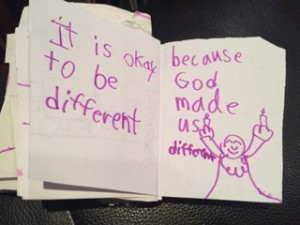“Christian” – a word that should evoke a positive response . . . images of people who desire to be like Jesus, loving and giving and serving.
But the word “Christian” comes with a lot of baggage and, to many, it carries a negative connotation. Often the images associated are those of mean-spirited, judgmental people who act nothing like Jesus. When I say I’m a Christian, I want to follow it with, “I’m not THAT kind of Christian.” But that just feeds the division, sounds self-righteous, and frankly, words are useless – it’s going to take consistently and authentically living with integrity to move the needle of perception.
Sometimes I get discouraged, but I’m not ready to shirk the Christian name altogether, or all the people who claim to be Jesus followers. The optimist in me hopes the name can be salvaged, along with other terms, like “church” and “evangelical.”
But I also believe that God could care less about labels or names – He cares about who we are. An atheist who is out in the world spreading love brings more honor to God than a Christian who is spreading hate. That might sound “heathenish” to churchgoers, but it doesn’t take much digging in the Bible to see that outward appearances and labels don’t matter much to God. (The parable of the Good Samaritan comes to mind (Luke 10:25-37), when the Priest and the Levite – both esteemed religious folks – passed by the person in need, but the “unclean” outsider, the Samaritan, was the one who honored God by demonstrating what it means to “love your neighbor.”)
Don’t get me wrong — I have been, and continue to be, surrounded by amazing Christian people who inspire me and give me hope. But the most vocal, the most extreme/sensational and newsworthy Christians dominate the narrative now (as I consider it, thinking about the Pharisees in the Bible, maybe negative extremists have always dominated and that’s why Jesus operated in such unexpected and subversive ways).

This is my little niece, Blakely. She’s not actually giving anyone the “bird;” she’s showing us her hurt finger. For me, this captures “mean” Christians so well – I don’t think they intend to flip people off by the things they say and do, but that’s how it looks sometimes.
If it was just a minority of obnoxious extremists, I could probably just roll my eyes and move along. But over the past year, in this divisive political environment, I am disturbed by the support that these Christian extremists enjoy (on both sides – there are angry, mean Christians on the right and left). I used to delude myself into thinking that “so-and-so would never say/do anything like that,” but I’ve watched in shock as otherwise kind and loving people have supported people and policies that are anything but kind and loving. It has been a wake-up call for me. I spent a lot of time grieving last year, destabilized by the trajectory of the Christian community, but I’ve accepted the reality now, and I’m ready to get to work, and get my hands dirty to try to make things better.
I’ve been chastised by some of my friends for portraying Christianity in a negative light (Christians like to look shiny. Don’t we all?), but I don’t see it that way. I love God, I love the Bible (but do not worship it), I love the church (but again, I do not worship it) – I am fully committed. You would be hard pressed to find a bigger cheerleader for the church. But I would have to be delusional not to see the problems and hypocrisy oozing from many of our institutions right now. On a personal level, we know it’s not healthy to bury negative feelings — we must deal with problems so that they will not fester and become bigger problems that can sink us emotionally and/or physically. This also applies corporately — we cannot bury the ugliness, and we are already seeing what happens when we try to pretend we have all the answers, when our beliefs and our faith are incongruent, when we spout platitudes instead of facing the pain that leads to healing.
We like to think the enemy is outside the church walls, but it has been comfortably hiding within the walls, within ourselves, all along.
However, I don’t see walking away from the church as a solution.
Many have left, for good reason, and I have lots of friends who seek and find God outside the church (after all, I believe He wants to be found, and the church is just one avenue). But I’m still a big believer in the church – I think corporately we can live out the gift of God’s love and grace in ways that we can’t when we’re alone. As Brian McLaren says in The Great Spiritual Migration, the church should be a school of love, “teaching people to live a life of love, from the heart, for God, for all people (no exceptions), and for all creation.” The right church can be transformative; the wrong church can be toxic; but overall, I still believe it’s worth the risk.
And I’m reminded that Jesus didn’t walk away from religious tradition – He showed us what it’s supposed to be. Traditions ground us and give us roots so that we can grow, but love transcends all traditions. Jesus showed us that it’s better to be loving than “right” and that people are more important than rules. Think about the woman caught in adultery . . . according to tradition/law, she deserved to be punished, but Jesus revealed the hypocrisy of her accusers, did not condemn her, and showed us that love is the greater priority. (John 8:1-11) Jesus said that He didn’t come to abolish the law and the prophets but to accomplish their purpose (Matt. 5:17).
Maybe God expects the same of us today – maybe we should not be looking to part with the church or find a new “label” for Christianity, but instead, live (individually and corporately) God’s true purpose.
Even after Christ, whose scandalous and radical love upended all our expectations of what religion is supposed to be, there seems to (historically) be only a remnant in each generation that reflects Christ. But God works best with the remnant – I think He laughs at our human predictions and expectations.
Keith and I love the Episcopal church that has embraced us. Thank God we found them when we did – they have kept me from becoming cynical (although you might not believe that after reading this blog). I’m so grateful to have discovered that there are all kinds of Christians (even liberal Christians, a description my conservative friends largely believe is an oxymoron – ha!) who are quietly, patiently, passionately sharing God’s love and serving under the radar. There ARE Christians (lots of them!) who are not addicted to certainty, who would rather be loving than “right,” who are not threatened by people who believe differently, who actually try to live the gospel message than Jesus demonstrated. We’re all going to encounter hypocrites (ahem, we are all going to BE hypocrites at one time or another) in every walk of life, but we don’t have to give up all the good things about community just to avoid a few fakes.
So what do I make of the “mean” Christians giving Christianity a bad name?
Well, I don’t know, because I am one.
We all love to feel justified and self-righteous (sucks to admit this). I’ve written about this numerous times because, apparently, I’m a slow learner (a favorite: Anger, Embarrassment, and God’s Irritating Grace)
I say that I don’t understand how people can claim God’s grace and deny it to others, but I do this all the time with people who irritate me. For example, I might not be mean or judgmental toward an LGBTQ person, but I’m perfectly capable of being mean and judgmental toward a person who hates an LGBTQ person. I have to fight it all the time (being judgmental of judgmental people, as Rachel Held Evans says).
And I’m not even going to get into sins of “omission.” I try really hard to avoid the “commission” sins (the ones you actively commit), but I stink at the “omission” sins (the ones we “omit” – basically, stuff we should be doing that we conveniently ignore) – sometimes the “mean” Christians are far better at avoiding apathy and laziness than the “nice” Christians. I talk about God’s love, but I’m not so great with the whole “living it” thing. I’d rather criticize a mean Christian for being a judgmental jerk than to actually get out there and love people.
The minute I want to create a line in the sand between myself and a “bad” Christian, I become a bad Christian (although this is inevitable because I’ve never been any good at being a Christian!) and I’m doing the very thing I hate. (It’s maddening that God won’t let me get on my high horse for just a little while – He has no problem knocking me off.)
In my better moments, I recognize that even mean-spirited Christians have good intentions – they truly believe their meanness is for your own good. That doesn’t make them right, but it does make them human. And as long as I humanize them instead of demonize them, then we have some common ground.
When I suggest to God that He should punish certain people (as if God pays any attention to my suggestions – humph!), I’m just condemning myself because we’re all capable of being and doing what we hate. So I’ll do my best to let God handle the judgey stuff. And since I’m a mess most the time, I’m grateful to serve a “compassionate and gracious God, slow to anger, abounding in love and faithfulness.” (Exodus 34:6)
And when I take all these gripes before the Lord, I walk away with renewed optimism because I know that He is bigger than all of this, than all of us and our petty, human ways. God is still drawing people to Himself in ways that we can’t understand or imagine – His love cannot be quelled and will “seep through” somehow. I love this quote from Richard Rohr: “When Christians ignore parts of their own message, it seems the Spirit always gets another group to emphasize it and spread it. Like flowing water, God always finds a way through. Receptive, flowing people are the ones who change the world and transform history.
Rohr also says “everything belongs” (Miranda Lambert, country music singer and redneck theologian, puts it this way . . . “it takes all kind of kinds”). Without evil, we would not know good; without sadness, we would know know joy; without judgment, we would not know mercy, and the list goes on. I don’t know how it all works together and why God designed us this way, but that’s one of those mysteries I have to trust to God. “Mean” Christians are the antithesis of Jesus, but I guess in a warped way, we need that contrast to see the truth.
So, yeah, Christians have a bad reputation – our “brand” has been damaged – but luckily, we aren’t a brand. We are flawed humans, made up of “all kinds of kinds,” trying to make sense of a total mystery, and God loves all of us, including the meanest among us (and those of us who feel mean toward the meanest among us).
Whatever label you use for me, just let it include “loved.”
I’m all-in.


 Follow
Follow share via email
share via email
Daughter of mine, you always bring a message from God just for me. I see myself in this blog. I want to shine God’s love to all and yet I feel resentment and judgement toward those who hurt others. I realize I could be in their shoes if not for God’s grace and love. Had I been raised in a different culture with a different religion I would have a different belief system. I pray for God to help me know how to pray for those people. But I think I need to be praying for myself for God to change me and reveal all the “meanest” in me. Change starts with me before others can change. I have been resentful and mean spirited with all the political “stuff” this past year and with “Christians.” I feel helpless and I take it out by bad mouthing about all that goes on. Thanks for showing me what God sees in me.
Gilda, I completely agree with you that change starts with each one of us, on the inside, and that we totally need to pray for ourselves. I might even go so far as to say we should pray first and foremost for ourselves, because we need to love ourselves rightly before we can even have a glimmer of hope to love others rightly. Loving ourselves well will go far to combat feelings of helplessness. What I mean is that when we really, deeply, fully grasp hold of the total rocking love that God has for us, our faith will zoom upward and we will be consumed with confidence and faith that God really does have it all under control. This is really freeing. Forget about kicking yourself for feeling resentful and mean! Do you want to hand the devil that kind of power and victory over your mind? Gilda, we have the mind of Christ! Let’s use it! The enemy wants nothing more than for you and me to go around down in the dumps feeling like worthless pieces of garbage, mean, resentful, losers. This is his fondest desire! To keep us immobilized by tricking us into feeling like we need to be a bunch of wimpy spineless goody-two-shoes in order to be a good Christian. Don’t fall for that lie! We need to speak the truth in love! That doesn’t mean cower and cringe and sugarcoat everything with phoney niceness! That is a deception of the devil. It means speak your truth in the confidence that Jesus Christ died to give you, and me, and anyone else who wants it! Yes, I agree with you that it is unproductive to bad mouth people or things. But there is a difference between badmouthing and expressing your opinions in the confidence of who you are in Christ, and confidence of who God is. Pray for God to teach you the difference. He will! Let’s serve the body of Christ in his strength, and in the full strength of the Spirit. Not roll over and play dead. That’s serving the devil, and we don’t want to do that. Duh! Gilda, you are an amazing, precious, wonderful creation in Christ! I’m delighting in you! Get pumped about that! Delight in that! I do, and I want you to as well! Tamson, the same goes for you, and Dale, you too 🙂 Thank you for reading.